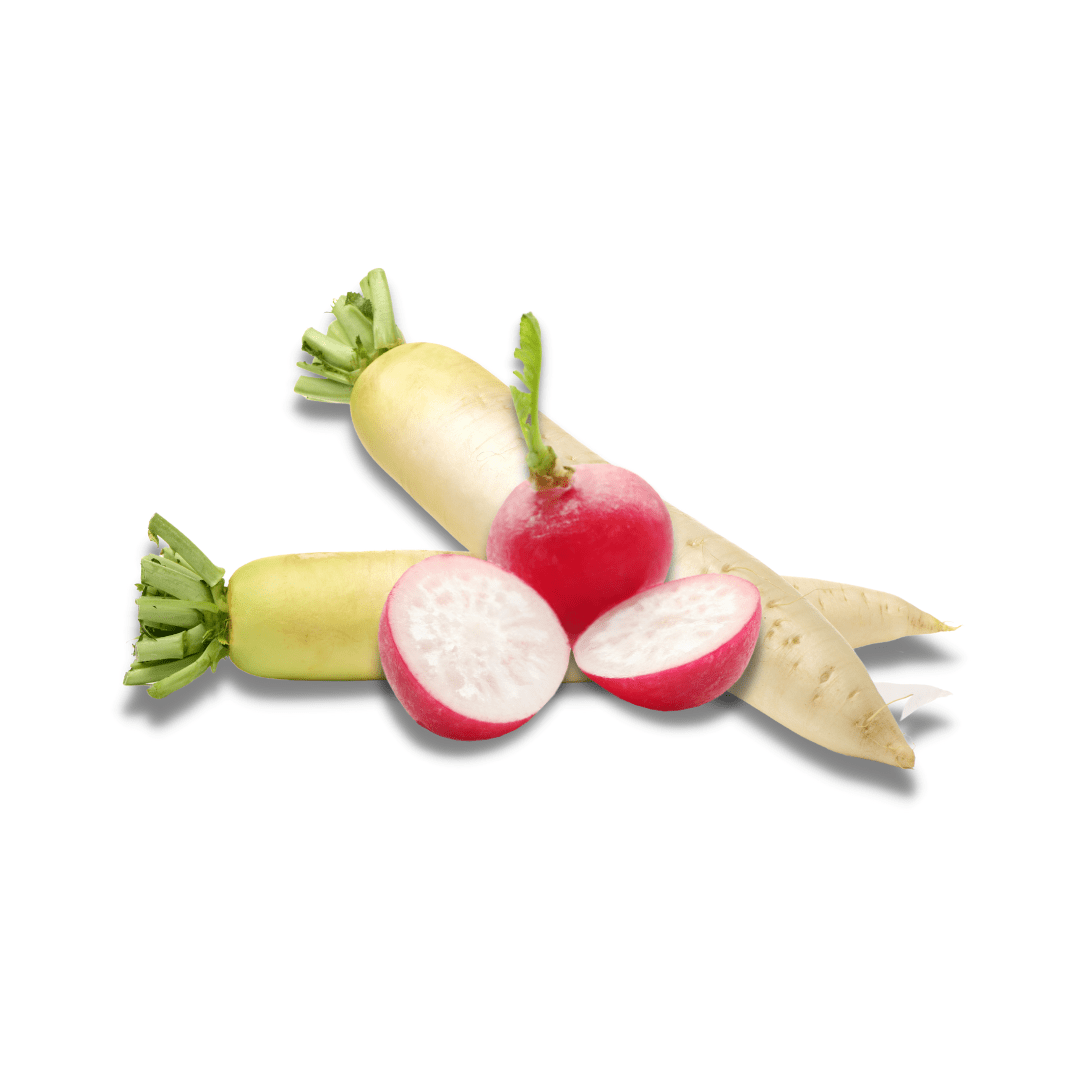About
Radish is a root vegetable that belongs to the Brassicaceae family, also known as the cruciferous vegetable family. It is a round or elongated-shaped vegetable with a white, red, or black skin and a white, crunchy flesh. Radishes are commonly consumed raw in salads or as a garnish, but they can also be cooked or pickled.
Health Benefits of Radish:
-
Rich in nutrients: Radishes are low in calories but high in vitamins and minerals, including vitamin C, potassium, and folate.
-
May aid in digestion: Radishes are a good source of fiber, which can help regulate bowel movements and promote a healthy digestive system.
-
May boost immunity: Radishes are rich in vitamin C, which can help boost the immune system and protect against diseases and infections.
-
May help regulate blood pressure: Radishes are high in potassium, which can help regulate blood pressure and reduce the risk of heart disease.
-
May improve skin health: The high vitamin C content in radishes can help improve skin health by promoting collagen production and reducing oxidative stress.
-
May have anticancer properties: Some studies suggest that radishes may have anticancer properties due to their high antioxidant content.
Diseases that can be cured with Radish:
- Digestive problems
- Respiratory disorders
- Jaundice
- Kidney problems
- Piles
- Cancer
Nutritional Content of Radish per serving of 50 grams:
Macronutrients
| Nutrient | Amount |
|---|---|
| Carbohydrate | 3.4 g |
| Protein | 0.6 g |
| Fat | 0.1 g |
| Fiber | 1.1 g |
| Water | 44.2 g |
Vitamins
| Vitamin | Amount (in mg or mcg) |
|---|---|
| Vitamin A | 1.2 mcg |
| Vitamin B1 | 0.01 mg |
| Vitamin B2 | 0.02 mg |
| Vitamin B3 | 0.2 mg |
| Vitamin B6 | 0.02 mg |
| Vitamin B12 | 0 mcg |
| Vitamin C | 8.5 mg |
| Vitamin D | 0 mcg |
| Vitamin E | 0.04 mg |
| Vitamin K | 0.1 mcg |
| Folate | 5.5 mcg |
| Biotin | 0.2 mcg |
Minerals
| Mineral | Amount (in mg) |
|---|---|
| Calcium | 14.5 mg |
| Iron | 0.3 mg |
| Iodine | 1.1 mcg |
| Zinc | 0.1 mg |
| Magnesium | 4.2 mg |
| Phosphorus | 17.5 mg |
| Potassium | 162 mg |
| Sodium | 7.5 mg |
| Chloride | 17.6 mg |
| Copper | 0.02 mg |
| Chromium | 0 mcg |
| Fluoride | 0 mcg |
| Molybdenum | 2.5 mcg |
| Manganese | 0.05 mg |
| Selenium | 0.4 mcg |
What are the health benefits of radishes?
Radishes are rich in vitamins, minerals, and antioxidants, and they promote digestion, support immune health, and may help in weight management.
How to use radishes in salads?
Radishes can be sliced or grated and added to salads for a crunchy texture and a peppery flavor that adds freshness and vibrancy to the dish.
Are there different types of radishes?
Yes, there are various types of radishes, including red radishes, daikon radishes, watermelon radishes, and black radishes, each with its own unique characteristics.
How to grow radishes in a garden?
Radishes are easy to grow in a garden. Sow the seeds directly into well-drained soil, water regularly, and harvest them in about 3-4 weeks.
Can radishes be cooked or eaten raw?
Radishes can be enjoyed both cooked and raw. They can be roasted, sautéed, pickled, or used as a raw crunchy addition to salads and sandwiches.
What nutrients are found in radishes?
Radishes are low in calories and high in fiber. They also contain vitamin C, potassium, and various antioxidants that promote good health.
How to choose fresh radishes at the market?
Look for radishes that are firm, smooth, and brightly colored. Avoid radishes that are soft, bruised, or have wilted leaves.
Are there any specific radish dishes in different cuisines?
Yes, radishes are used in various cuisines. In Mexican cuisine, radishes are often used in traditional dishes like tacos and salsas.
How do radishes contribute to flavor profiles?
Radishes have a crisp texture and a slightly spicy and peppery flavor that adds a refreshing and zesty element to dishes.
Where can I buy organic radishes?
Organic radishes can be found at local farmers' markets, organic grocery stores, or through online grocery delivery services.
What are the culinary uses of radishes?
Radishes can be used in salads, sandwiches, salsas, stir-fries, soups, pickles, and as a garnish for various dishes.
How to enhance the texture of dishes with radishes?
Radishes can add a crunchy texture to dishes when thinly sliced or grated. They provide a refreshing and crisp element to the overall dish.
Can radishes be pickled or fermented?
Yes, radishes can be pickled or fermented to enhance their flavor and increase their shelf life. Pickled radishes are often used as a condiment or topping.









